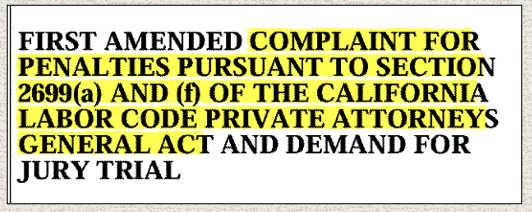
In 2020, a California certified general appraiser filed a lawsuit against Wells Fargo in state court under a special section of the California Labor Code called the Private Attorneys General Act (PAGA). Essentially, PAGA enables private parties and their attorneys to step into the shoes of the State of California to enforce certain parts of the Labor Code and collect statutory penalties from defendants for non-compliance.
The plaintiff appraiser in this case alleged that he and other commercial appraisers who performed assignments for the bank as members of the bank’s appraiser panel were improperly treated under California law as independent contractors. He alleged they should have been treated as employees. Based on the alleged misclassification, the penalties he sought in the lawsuit were for violations such as:
- failing to authorize and permit the appraisers to take meal and rest breaks to which they would be entitled as employees;
- failing to pay the appraisers overtime wages;
- failing to provide accurate, itemized wage statements; and
- failing to reimburse appraisers for necessary business expenses.
These are items for which penalties exist per violation under California’s Labor Code.
To establish his claims, the plaintiff appraiser needed to show that Wells Fargo’s contractor classification of the appraisers was improper. This meant applying California’s Labor Code and court decisions. In brief, it required the plaintiff to show that he and other commercial appraisers were subject to such a degree of control over their work that they were functionally the bank’s employees. Accordingly, the plaintiff pointed to policies and practices that he alleged illustrated control and direction over their work:

As many plaintiffs do in such actions, he denigrated his own professional work as being trivial, without independent or professional judgment. (These cases certainly don’t do anything to uplift the profession.)
The bank, of course, had strong counter arguments to plaintiff’s claims. Here are a few highlights. The bank pointed out that plaintiff and similar appraisers engaged by the bank:
“had discretion to decide whether to bid on a particular appraisal (and if so, what fee to charge), when to do the work, where to do it, what to do (including whom to interview, what analysis to perform, whether to hire additional help, etc.), and which equipment and materials to use, among other things.”
The bank further pointed to evidence that the plaintiff appraiser:
- Owned and operated not one but two of his own businesses.
- Performed services for numerous other institutional and corporate clients.
- Was never required to bid on a project; whether or not he bid on a project was entirely his choice.
- Received nearly 2,700 requests to bid during the relevant time period and, of those, bid on fewer than 135 and was awarded assignments on just a handful of occasions.
At the end of the day, however, the bank agreed to settle plaintiff’s claims. That settlement is pending the court’s approval. Under the proposed settlement agreement, the bank has agreed to a gross settlement of $460,000 of which: $153,000 will go the to plaintiff’s attorneys, $199,000 to state (for the statutory penalties), and $66,000 will be divided by approximately 195 commercial appraisers who performed assignments for the bank during the time period covered by the lawsuit (yes, that’s just about $338 per appraiser). The remainder will cover administrative costs. The bank’s total exposure for penalties would have been $1,619,000, according to the settlement motion. Remember the bulk of the case was only about penalties collectible by the state – not wages or overtime. However, the plaintiff did have individual claims for such damages and, under the proposed settlement, he is slated to receive $20,000. The bank also likely spent several hundred thousand dollars defending itself.
If your organization utilizes appraisers as contractors, there are key takeaways. Here are a few:
- This is not the only case pending about classification of appraisers as contractors. As appraisers face lower work volumes, we may see more.
- Strong written service agreements with contractor appraisers are a necessity under the exemption enacted for appraisers (in Labor Code § 2778) from the “ABC test” created by AB 5.
- Many firms, AMCs and lenders never made updates to their contracting practices with California appraisers to work in alignment with the appraiser exemption.
- A true “appraisal firm” would have a difficult challenge to defend contractor classification of “staff appraisers” given that a bank – such as Wells Fargo – could not easily prevail against such claims by the appraisers it engaged from a panel for individual assignments.
Because appraisers and appraisal firms continue to misunderstand or misapply California independent contractor law, I address the subject in my new class offering “Federal and California Laws and Regulations for Appraisers – with Real World Relevance.“
(A copy of the motion for approval of the settlement is here: Fritz v. Wells Fargo, Motion for Approval of Settlement.)